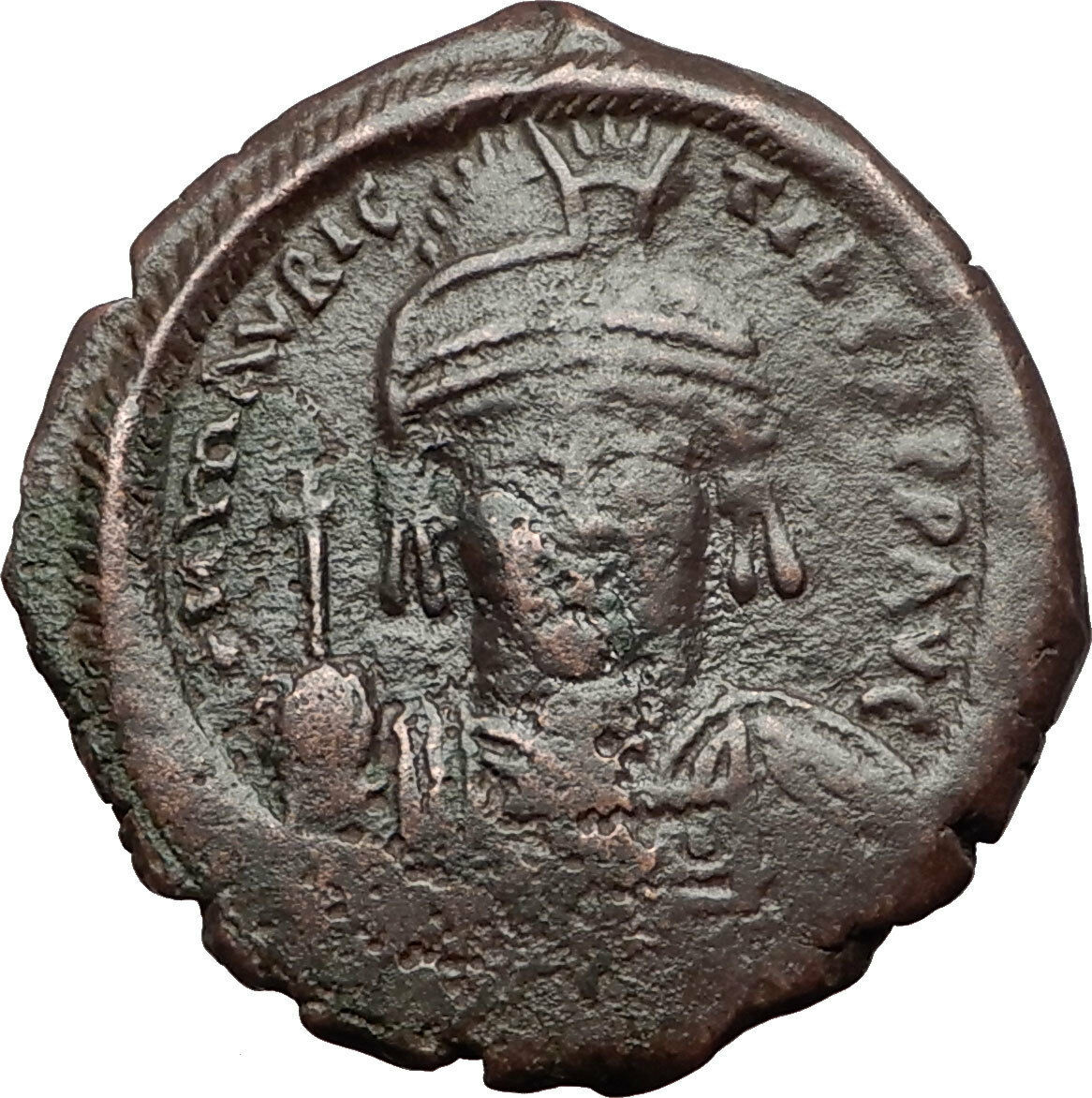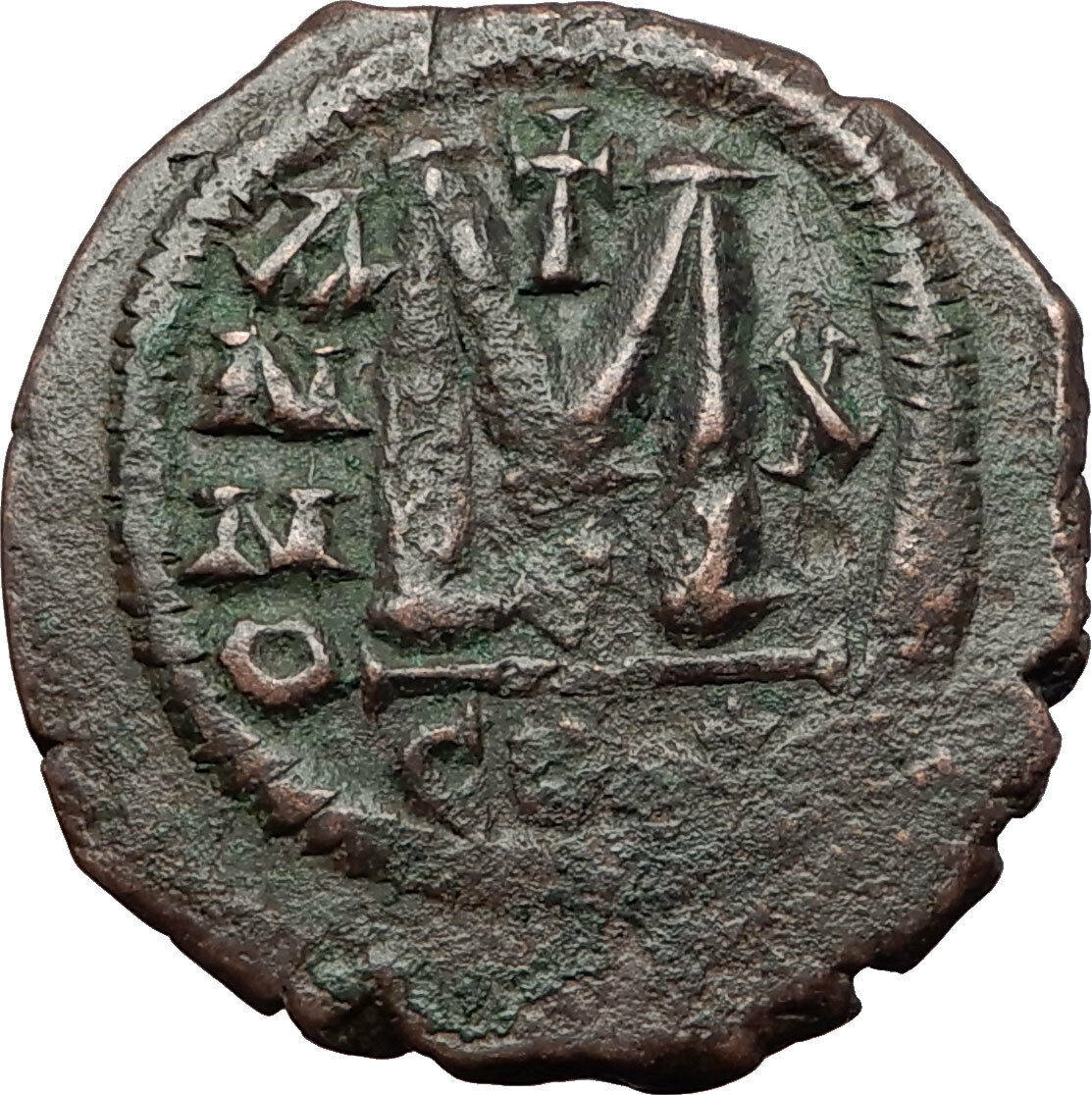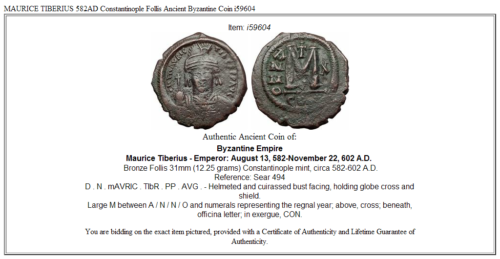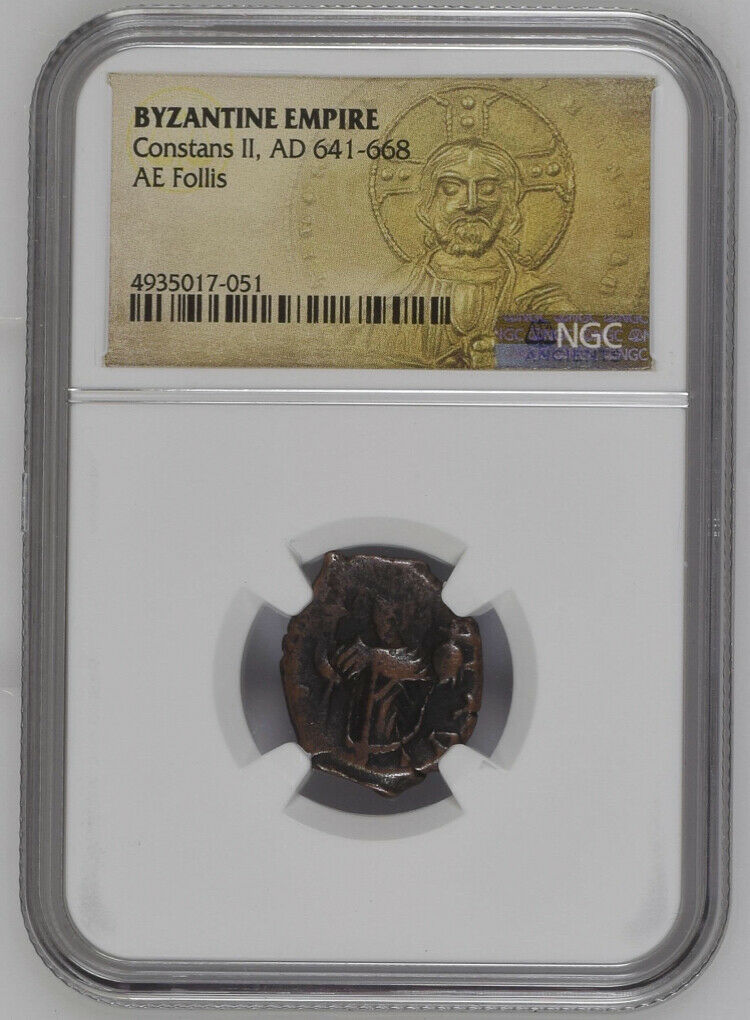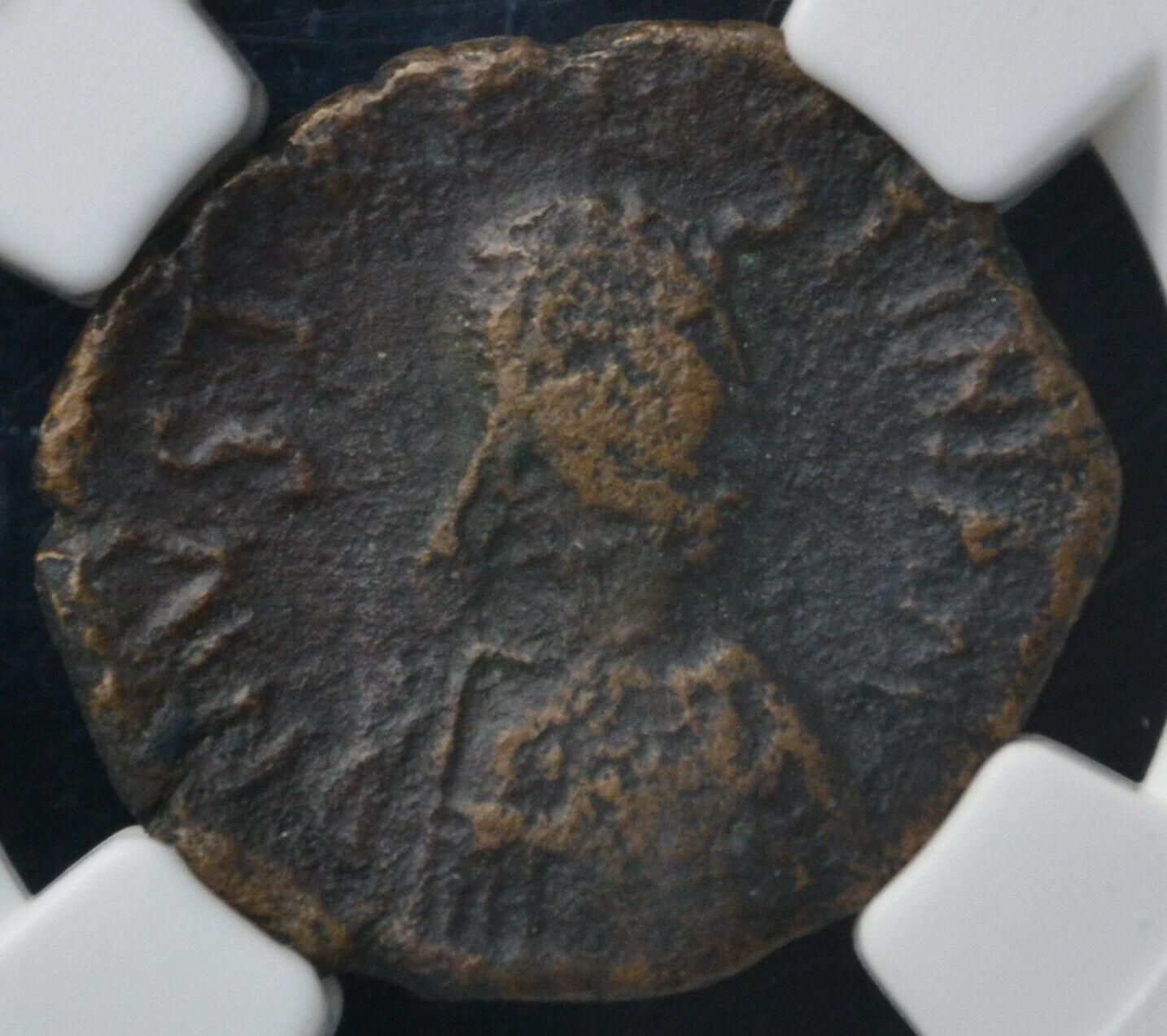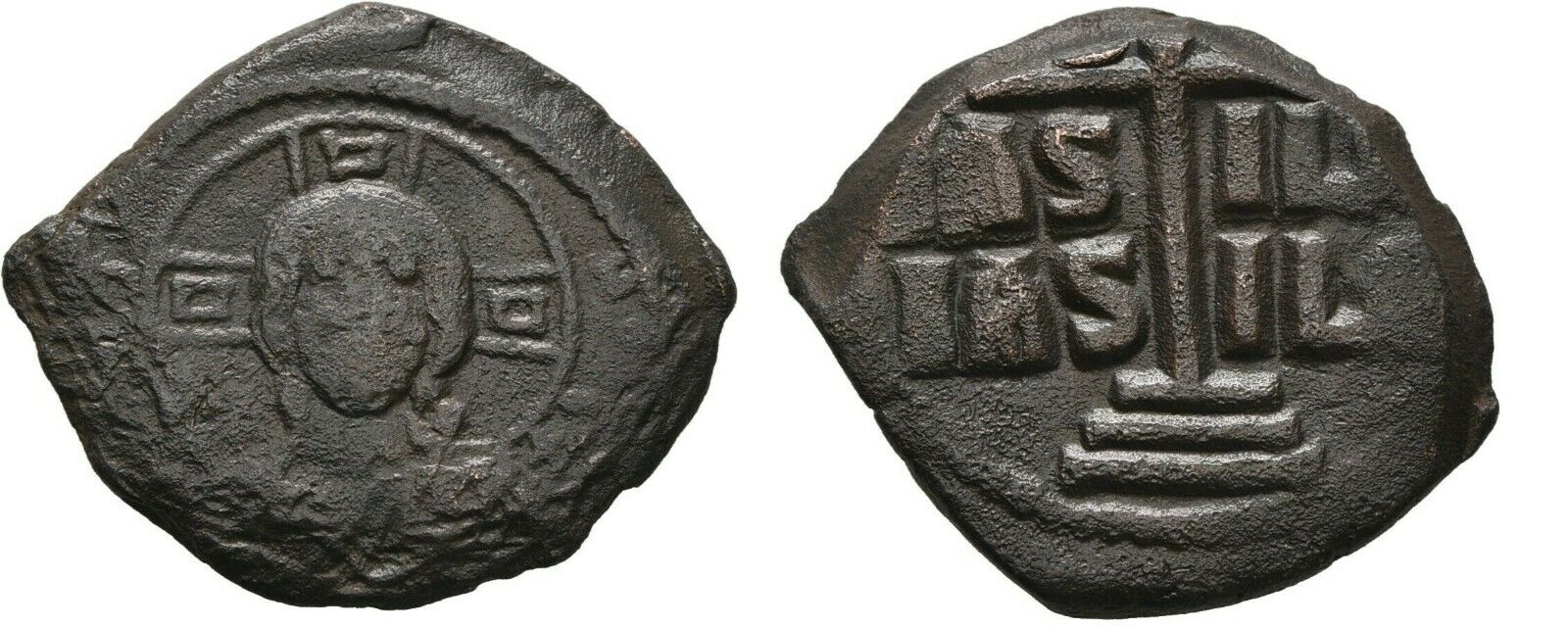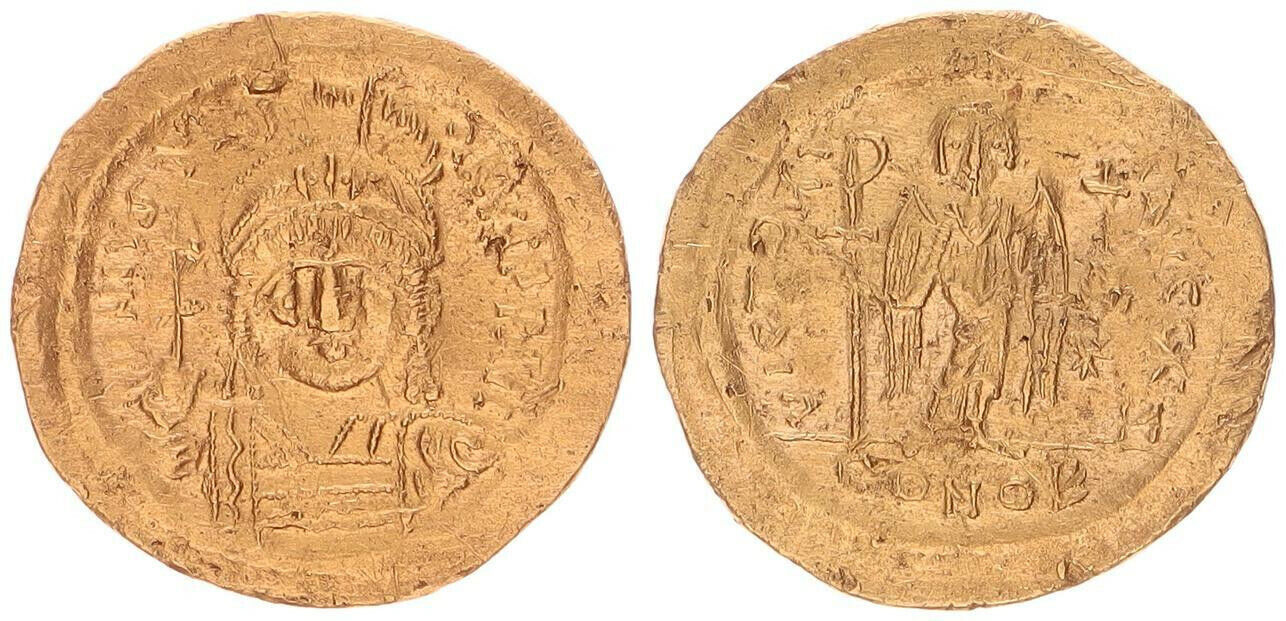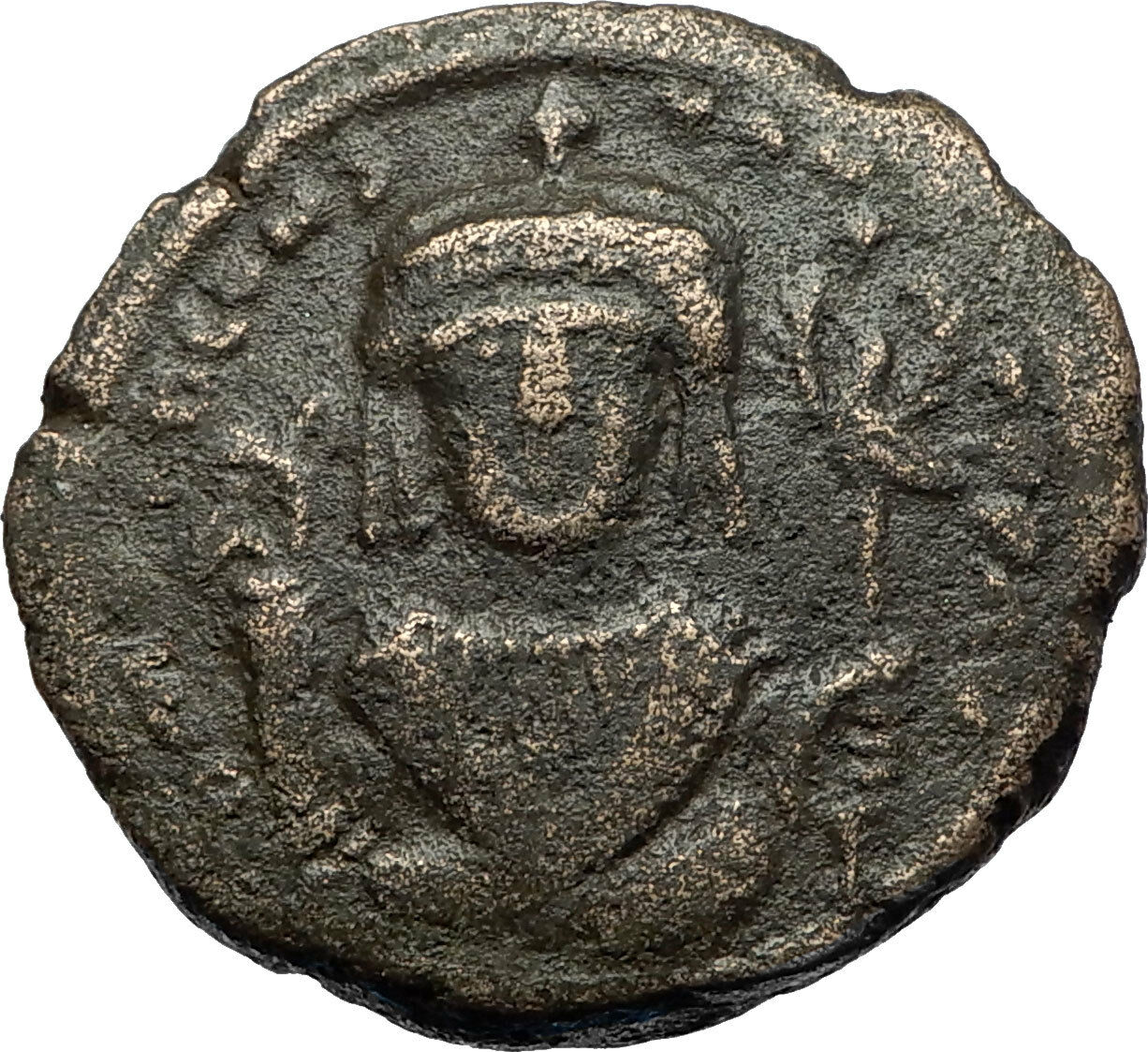-40%
MAURICE TIBERIUS 582AD Constantinople Follis Ancient Byzantine Coin i59604
$ 89.76
- Description
- Size Guide
Description
Item:i59604
Authentic Ancient Coin of:
Byzantine Empire
Maurice Tiberius - Emperor: August 13, 582-November 22, 602 A.D.
Bronze Follis 31mm (12.25 grams) Constantinople mint, circa 582-602 A.D.
Reference: Sear 494
D . N . mAVRIC . TIbЄR . PP . AVG . - Helmeted and cuirassed bust facing, holding globe cross and shield.
Large M between A / N / N / O and numerals representing the regnal year; above, cross; beneath, officina letter; in exergue, CON.
You are bidding on the exact item pictured, provided with a Certificate of Authenticity and Lifetime Guarantee of Authenticity.
Maurice Tiberius
(
Latin
:
Flavius Mauricius Tiberius Augustus
;
Greek
:
Φλάβιος Μαυρίκιος Τιβέριος Αὔγουστος
) (539 – 27 November 602) was
Eastern Roman Emperor
from 582 to 602.
A prominent general in his youth, Maurice fought with success against the
Sassanid Persians
. Once he became Emperor, he brought the
war with Sasanian Persia
to a
victorious conclusion
: the Empire's eastern border in the
Caucasus
was vastly expanded and for the first time in nearly two centuries the Romans were no longer obliged to pay the Persians thousands of pounds of gold annually for peace.
Maurice
campaigned extensively
in the
Balkans
against the
Avars
– pushing them back across the
Danube
by 599. He also conducted campaigns across the Danube, the first Roman Emperor to do so in over two centuries. In the West, he established two large semi-autonomous provinces called
exarchates
, ruled by
exarchs
, or viceroys, of the emperor.
In Italy, Maurice established the
Exarchate of Ravenna
in 584, the first real effort by the Empire to halt the advance of the
Lombards
. With the creation of the
Exarchate of Africa
in 590, he further solidified the power of Constantinople in the western
Mediterranean
.
His reign was troubled by financial difficulties and almost constant warfare. In 602, a dissatisfied general named
Phocas
usurped the throne, having Maurice and his six sons executed. This event would prove cataclysmic for the Empire, sparking a
twenty-six year war
with Sassanid Persia which would leave both empires devastated prior to the
Muslim conquests
.
His reign is a relatively accurately documented era of
Late Antiquity
, in particular by the
historian
Theophylact Simocatta
. The
Strategikon
, a
manual of war
which influenced European and Middle Eastern military traditions for well over a millennium, is traditionally attributed to Maurice.
Biography
Origins and early life
Maurice was born in
Arabissus
in
Cappadocia
in 539, the son of a certain
Paul
. He had one brother,
Peter
, and two sisters, Theoctista and Gordia, later the wife of the general
Philippicus
. He is recorded to have been a native Greek speaker, unlike previous emperors since
Anastasius I Dicorus
. He may have been a
Cappadocian Greek
,
[4]
or possibly he was a
Hellenized
Armenian
. This issue cannot be determined in any way. The historian
Evagrius Scholasticus
records a (likely invented) descent from old
Rome
.
Maurice first came to
Constantinople
as a
notarius
, and came to serve as a secretary to the
comes excubitorum
(commander of the
Excubitors
, the imperial bodyguard) Tiberius, the future
Tiberius II
(r. 578–582). When Tiberius was named
Caesar
in 574, Maurice was appointed to succeed him as
comes excubitorum
.
Persian War and accession to the throne
Map of the Roman-Persian frontier showing Maurice's gains after he reinstated Sassanid king Khosrau II on the throne in 591
For more details on this topic, see
Byzantine–Sassanid War of 572–591
.
In late 577, despite a complete lack of military experience, Maurice was named as
magister militum
per
Orientem
, effectively commander-in-chief of the Byzantine army in the East, in the
ongoing war
against
Sassanid Persia
, succeeding the general
Justinian
. At about the same time, he was raised to the rank of
patricius
.
[8]
He scored a decisive victory against the Persians in 581. A year later, he married
Constantina
, the Emperor's daughter. On 13 August, he succeeded his father-in-law as Emperor. Upon his ascension he ruled a bankrupt Empire. At war with Persia, paying extremely high tribute to the
Avars
, and the Balkan provinces thoroughly devastated by the
Slavs
, the situation was tumultuous at best.
Maurice had to continue the war against the Persians. In 586, his troops defeated them at the
Battle of Solachon
south of
Dara
. Despite a serious mutiny in 588, the army managed to continue the war and even secure a
major victory
before
Martyropolis
. In 590, the two
Parthian
brothers
Vistahm
and
Vinduyih
overthrew king
Hormizd IV
and made the latter's son, Prince
Khosrau II
, as the new king. However, the former Iranian commander-in-chief
Bahram Chobin
,
who had rebelled against Hormizd IV
, claimed the throne for himself and defeated Khosrau, who along with the two Parthian brothers subsequently fled to the Byzantine court. Although the Senate advised against it with one voice, Maurice helped Khosrau regain his throne with an army of 35,000 men. In 591 the combined Byzantine-Persian army under generals
John Mystacon
and
Narses
defeated Bahram Chobin's forces near
Ganzak
at the
Battle of Blarathon
. The victory was decisive; Maurice finally brought the war to a successful conclusion by means of a new accession of Khosrau.
Subsequently, Khosrau was probably adopted by the emperor. Khosrau further rewarded Maurice by ceding to the Empire western
Armenia
up to the lakes
Van
and
Sevan
, including the large cities of
Martyropolis
,
Tigranokert
,
Manzikert
,
Ani
, and
Yerevan
. Maurice's treaty brought a new status-quo to the east territorially, enlarged to an extent never before achieved by the Empire, and much cheaper to defend during this new perpetual peace – millions of solidi were saved by the remission of tribute to the Persians alone. Afterwards, Maurice imposed a union between the Armenian Church and the Patriarchate of
Constantinople
.
Balkan warfare
For more details on this topic, see
Maurice's Balkan campaigns
.
After his victory on the eastern frontier, Maurice was free to focus on the
Balkans
. The Slavs, having pillaged the Byzantine Balkan provinces for decades, probably began settling the land from the 580s on. The Avars took the strategically important fort of
Sirmium
in 582, using it as a base of operations against several poorly defended forts alongside the Danube. In 584 the Slavs threatened the capital and in 586 Avars besieged
Thessalonica
, while Slavs went as far as the
Peloponnese
. In 591 Maurice launched several campaigns against Slavs and Avars – with good prospect of turning the tide.
In 592 his troops retook
Singidunum
from the Avars. His commander-in-chief
Priscus
defeated Slavs, Avars and
Gepids
south of the Danube in 593. The same year he crossed the Danube into modern-day
Wallachia
to continue his series of victories. In 594 Maurice replaced Priscus with his rather inexperienced brother
Peter
, who despite initial failures, nonetheless scored another victory in Wallachia. Priscus, now in command of another army further upstream, defeated the Avars again in 595. The latter only dared to attack again peripherally in
Dalmatia
two years later. In 598 a treaty was signed with the Avar leader
Bayan I
, only to be broken for retaliation campaigns inside Avar homeland. In 599 and 601, the Byzantine forces wreaked havoc amongst the Avars and Gepids. In 602 the Slavs suffered a crushing defeat in Wallachia. The Byzantine troops were now able to hold the Danube line again. Meanwhile, Maurice was making plans for resettling devastated areas in the Balkans by using Armenian settlers.
[9]
Measures of domestic policy
In the west, he organized the threatened Byzantine dominions in
Italy
and
Africa
into exarchates, ruled by military governors or
exarchs
, in 584 and 591 respectively. The exarchs had more or less complete military and civil authority. This was a remarkable exception to the usual separation of civil and military powers in that era. By founding the Exarchate of Ravenna, Maurice managed to slow the Lombard advance in Italy.
In 597, an ailing Maurice wrote his last will, in which he described his ideas of governing the Empire. His eldest son,
Theodosius
, would rule the East from
Constantinople
; his second son, Tiberius, would rule the West from
Rome
. Some historians believe he intended for his younger sons to rule from Alexandria, Carthage, and Antioch. His intent was to maintain the unity of the Empire, making this idea bear a strong resemblance to the
Tetrarchy
of Diocletian. However, Maurice's violent death prevented these plans from coming to fruition.
In religious matters, Maurice was very tolerant toward
Monophysitism
, although he was a supporter of the
Council of Chalcedon
. He clashed with
Pope Gregory I
over the latter's defense of Rome against the
Lombards
.
[10]
Maurice's efforts to consolidate the Empire slowly but steadily found success, especially due to the peace with Persia. His initial popularity apparently declined during his reign, mostly because of his fiscal policies. In 588, he announced a cut in military wages by 25%, leading to a serious mutiny by troops on the Persian front. He refused to pay a very small ransom in 599 or 600 to free 12,000 Byzantine soldiers taken prisoner by the Avars. The prisoners were killed, and a protesting military delegation, headed by an officer named Phocas (subsequently
emperor Phocas
), was humiliated and rejected in Constantinople.
Death
In 602, Maurice, always dealing with the lack of money, decreed that the army should stay for winter beyond the
Danube
, which would prove to be a serious mistake. The exhausted troops mutinied against the Emperor. Probably misjudging the situation, Maurice repeatedly ordered his troops to start a new offensive rather than returning to winter quarters. After a while, his troops gained the impression that Maurice no longer mastered the situation, proclaimed
Phocas
their leader, and demanded that Maurice abdicate and proclaim as successor either his son Theodosius or General
Germanus
. Both men were accused of treason, but riots broke out in Constantinople, and the emperor left the city with his family for
Nicomedia
. Theodosius headed east to Persia, but historians are not sure whether he had been sent there by his father or if he had fled there. Phocas entered Constantinople in November and was crowned Emperor, while his troops captured Maurice and his family.
Maurice was murdered on 27 November 602 (some say 23 November). It is said that the deposed emperor was forced to watch his six sons executed before he was beheaded himself. Empress Constantina and her three daughters were spared and sent to a monastery. The Persian King Khosrau II used this coup and the murder of his patron as an excuse for a renewed war against the Empire.
Legacy
The Roman Empire in 600 AD.
Maurice is seen as an able emperor and commander-in-chief, though the description by Theophylact may be a bit too glorifying. He possessed insight, public spirit, and courage. He proved his expertise on military and foreign affairs during his campaigns against Persians, Avars and Slavs, and also during peace negotiations with Khosrau II. His administrative reforms reveal him as a farsighted statesman, all the more since they outlasted his death by far and were the basis for the introduction of such themes as military districts.
His court still used
Latin
, as did the army and administration, and he promoted science and the arts. Maurice is traditionally named as author of the military treatise
Strategikon
, which is praised in military circles as the only sophisticated
combined arms
theory until
World War II
. Some historians now believe the
Strategikon
is the work of his brother or another general in his court, however.
His greatest weakness was his inability to judge how unpopular his decisions were. As summarized by the historian
C. W. Previté-Orton
, listing a number of character flaws in the Emperor's personality:
His fault was too much faith in his own excellent judgment without regard to the disagreement and unpopularity which he provoked by decisions in themselves right and wise. He was a better judge of policy than of men.
It was this flaw that cost him throne and life, and thwarted most of his efforts to prevent the disintegration of the great empire of
Justinian I
.
The demise of Maurice was a turning point in history. The resulting war against Persia weakened both empires, enabling the Slavs to permanently settle the Balkans and paving the way for Arab/Muslim expansion. English historian
A.H.M. Jones
characterizes the death of Maurice as the end of the era of
Classical Antiquity
, as the turmoil that shattered the Empire in the next four decades permanently and thoroughly changed society and politics.
Family relations
Maurice's marriage was fertile and produced nine known children:
Theodosius
(4 August 583/585 – after 27 November 602). According to John of Ephesus, he was the first heir born to a reigning emperor since the reign of
Theodosius II
(408–450).
[12]
He was appointed Caesar in 587 and co-emperor on 26 March 590.
Tiberius
(died 27 November 602).
Petrus (died 27 November 602).
Paulus (died 27 November 602).
Justin (died 27 November 602).
Justinian (died 27 November 602).
Anastasia (died c. 605).
Theoctista (died c. 605).
Cleopatra (died c. 605).
A daughter
Miriam/Maria
is recorded by the 12th-century chronicler
Michael the Syrian
and other eastern sources as married to
Khosrau II
, but not in any Byzantine Greek ones; she is probably legendary.
His brother
Petrus
(c. 550 – 602) became the
curopalates
and was killed at the same time as Maurice was. Petrus married Anastasia Aerobinda (born c. 570), daughter of Areobindus (born c. 550), and had female issue.
His sister Theoctista (c. 540 – after 582) married a husband who died before 582, and had a daughter Gordia (c. 560 – after 597), who married Marinus (c. 555 – after 597), son of Nerses (c. 530 – after 595) and wife Hesychia (born c. 535), by whom she had a daughter Theoctista (c. 575/c. 580 – after 597), married to Christodorus or Christodoros (born c. 570) and had issue.
His sister Gordia (c. 550 – after 602) married
Philippicus
(c. 550 –
Chrysopolis
, 614),
General
,
comes excubitorum
and
magister militum
in 582, by whom she had a daughter, who married Artabastus (Artavazd) Mamikonian (born c. 565), and had issue.
Personage of legends
The first legendary stories on the life of the emperor Maurice are recorded in the ninth century, in the work of the Byzantine historian
Theophanes the Confessor
. According to his chronicle (Chronographia), the death of the imperial family is decided by a divine intervention: Christ has asked the emperor to choose between a long reign on his empire or the death and acceptance in the kingdom of heaven. Maurice prefer the second choice. The same story has been reported by a short syriac hagiography on the life of the emperor, which was sanctified later by the Byzantine Orthodox Church. According to the syriac authors, the emperor asked in prayer to receive a punishment in this world and a "perfect reward" in the kingdom of heaven. The choice is offered here by an angel: “
”(The angel) saw him while he was praying and said," You're tired God with your requests since a long time. You asked God and you requires to suffer here (bottom) the punishment of the sin of which you would not be worthy of the perfect reward, and not to be deprived on his account from the perfect reward. I can attest to you that you have made a sin which deprive yourself of the higher reward; however you will have the fate of the saints. If you want to keep your kingdom and the lives of your children for long time, ceases to address this demand and in the resurrection your reward will be that of the just. If you want the highest reward and to be punished here, this shall be your punishment: you will be deprived of your kingdom, your children will be slaughtered before your eyes, and in the end your enemies will burn you. So choose what you want. ”
According to another legend of the same text, Maurice had also prevented a nurse to substitute his own son to one of his children and so save from the executioner at least one of the heirs of the empire. This legend will not cease to amplify in the Balkans. Maurice was the last emperor of a
Illyrian
dynasty whose origin is in the center of the Balkans, in the city of
Justiniana Prima
, and the peoples of the region identified themselves with his family. Romanian authors noted parallels between the legends on the death of the prince
Constantin Brâncoveanu
and stories about the death of the Byzantine imperial family. Just before the execution, the gypsy nurse of the youngest son of Brancoveanu, replaces the prince by his own son, to save at least one heir of the royal family. Like the Byzantine emperor, the Romanian ruler refused. The angel’s proposal to the emperor to choose between a long life in this world and the life in the kingdom of heaven as the motif of the death of nine princes are recurrent in the epic tradition of the Albanian and south Slavs mountaineers. The central personage of the Albanian Cycle of Kreshniks, Gjeto Muji (Muji the foundling), his wife Ajkuna (or Kuna according to the songs) reflect – for the Albanian scholars – the names and the history of Emperor Maurice and his wife
Aelia Constantina
. The nine Tiberii were remembered in Albanian songs as the nine
dibrans
. Also in the Montenegrin epic the legendary prince Nahod Momir (Momir the foundling) and her sister Grozdana are related to the emperor and his sister Gordia. The epic epithet the "foundling" reflect the episode of Maurice adoption by the Emperor Tiberius, and by the imperial dynasty of Justin. In the Bosnian epic, the emperor is called Mouio Tcarevitch (Mouio the son of the emperor).
See also
Byzantine Empire portal
List of Byzantine emperors
Frequently Asked Questions
Mr. Ilya Zlobin, world-renowned expert numismatist, enthusiast, author and dealer in authentic ancient Greek, ancient Roman, ancient Byzantine, world coins & more.
Who am I dealing with?
You are dealing with Ilya Zlobin, ancient coin expert, enthusiast, author and dealer with an online store having a selection of over 15,000 items with great positive feedback from verified buyers and over 10 years experience dealing with over 57,000 ancient and world coins and artifacts. Ilya Zlobin is an independent individual who has a passion for coin collecting, research and understanding the importance of the historical context and significance all coins and objects represent. Most others are only concerned with selling you, Ilya Zlobin is most interested in educating you on the subject, and providing the largest selection, most professional presentation and service for the best long-term value for collectors worldwide creating returning patrons sharing in the passion of ancient and world coin collecting for a lifetime.
How long until my order is shipped?
Orders are shipped by the next business day (after receipt of payment) most of the time.
How will I know when the order was shipped?
After your order has shipped, you will be left positive feedback, and that date could be used as a basis of estimating an arrival date. Any tracking number would be found under your 'Purchase history' tab.
USPS First Class mail takes about 3-5 business days to arrive in the U.S. International shipping times cannot be estimated as they vary from country to country.
Standard international mail to many countries
does not
include a tracking number, and can also be slow sometimes.
For a tracking number and signature confirmation, you may want to do Express Mail International Shipping, which costs more, however, is the fastest and most secure. Additionally you may be able to receive your order in as little as 3-5 business days using this method. For Express Mail International, it may be possible to place up to 10-15 items in one package (for the one shipping cost) as it is flat rate envelope, which may be the most cost-effective, secure and fastest way to receive items internationally. Send me a message about this and I can update your invoice should you want this method.
Getting your order to you, quickly and securely is a top priority and is taken seriously here.
Great care is taken in packaging and mailing every item securely and quickly.
Please be aware, I cannot take responsibility for any postal service delivery delays, especially for international packages as it may happen in rare instances.
What is a certificate of authenticity and what guarantees do you give that the item is authentic?
Each of the items sold here, is provided with a Certificate of Authenticity, and a Lifetime Guarantee of Authenticity, issued by a world-renowned numismatic and antique expert that has identified over 57,000 ancient coins and has provided them with the same guarantee. You will be very happy with what you get with the COA; a professional presentation of the coin, with all of the relevant information and a picture of the coin you saw in the listing. Additionally, the coin is inside it's own protective coin flip (holder), with a 2x2 inch description of the coin matching the individual number on the COA.
On the free-market such a presentation alone, can be considered a - value all in itself, and it comes standard with your purchases from me,
FREE.
With every purchase, you are leveraging my many years of experience to get a more complete context and understanding of the piece of history you are getting. Whether your goal is to collect or give the item as a gift, coins presented like this could be more prized and valued higher than items that were not given such care and attention to.
Buy a coin today and own a piece of history, guaranteed.
Is there a money back guarantee?
I offer a 30 day unconditional money back guarantee. I stand behind my coins and would be willing to exchange your order for either store credit towards other coins, or refund, minus shipping expenses, within 30 days from the receipt of your order. My goal is to have the returning customers for a lifetime, and I am so sure in my coins, their authenticity, numismatic value and beauty, I can offer such a guarantee.
Is there a number I can call you with questions about my order?
You can contact me directly via ask seller a question and request my telephone number, or go to my About Me Page to get my contact information only in regards to items purchased on eBay.
When should I leave feedback?
Once you receive your order, please leave a positive feedback. Please don't leave any negative feedbacks, as it happens sometimes that people rush to leave feedback before letting sufficient time for their order to arrive. Also, if you sent an email, make sure to check for my reply in your messages before claiming that you didn't receive a response. The matter of fact is that any issues can be resolved, as reputation is most important to me. My goal is to provide superior products and quality of service.
How and where do I learn more about collecting ancient coins?
Visit the "Guide on How to Use My Store" for on an overview about using my store, with additional information and links to all other parts of my store which may include educational information on topics you are looking for.
You may also want to do a YouTube search for the term "ancient coin collecting" for educational videos on this topic.
